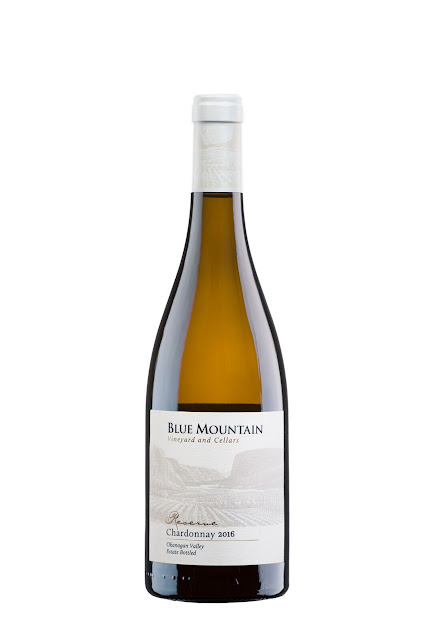International Chardonnay Day is May 23. Consumers in British
Columbia do not lack for excellent Chardonnays to drink on that (or any other)
day.
Few producers have been growing Chardonnay and turning it into
a consistently fine wine longer than Blue Mountain Vineyard & Cellars at
Okanagan Falls.
The winery has just released its 2016 Reserve Chardonnay.
According to the specification sheet, that wine was made with fruit from
27-year-old vines. In other words, from vines that were planted in 1992.
The Mavety family have been growing grapes on their vineyard
since the early 1970s. Initially, they were growing the same hybrid varieties
that most other vineyards had planted. Conventional wisdom at the time was that
the Okanagan was too cool for the classic European grape varieties.
By the mid-1980s, Ian Mavety recognized that the Okanagan
could not compete with international wines just with such varieties as Maréchal
Foch, De Chaunac and Okanagan Riesling. He began redeveloping this vineyard,
initially planting Pinot Blanc, Riesling, Gewürztraminer and Müller-Thurgau.
The latter three varieties were replaced after Ian concluded they would not
produce very good wine in his terroir.
After visiting vineyards in France, he decided that the best
varieties for the Okanagan Falls are were the Burgundian ones and the Pinots.
The vineyard was redeveloped with Pinot Noir, Gamay Noir, Pinot Gris and
Chardonnay.
His first block of Chardonnay was planted in 1990. Today, the
vineyard grows 21 acres of Chardonnay.
In my very first edition of The Wineries of British Columbia, published in 1994, I noted that
Blue Mountain opened in 1992 with a Pinot Noir and two whites from the 1991
vintage – Pinot Blanc and Pinot Gris. The first Chardonnay was released from
the 1993 vintage.
Few, if any, other producers were then growing Chardonnay; but
several blocks in private vineyards signalled that Chardonnay would succeed in
the Okanagan. When Robert Combret moved his family from France to the Okanagan
to establish Domaine Combret in 1994, he bought an established Golden Mile vineyard
from a grower named Joe Fatur. He was growing Chardonnay. A few years later,
the Combrets made a Chardonnay that won the Okanagan’s first gold medal at the
Chardonnay du Monde competition.
About the same time, Mission Hill bought some Chardonnay in
1992 from a neighbouring grower to Fatur. That fruit produced the wine that won
the Avery Trophy at a major London competition in 1994. With classic hyperbole,
Mission Hill positioned that as the best Chardonnay in the world. It was a very
good wine and it started to put the Okanagan on the map.
These vineyards are now owned by the parent company of CheckMate
Winery, which specializes in just Chardonnay (and Merlot). Earlier this year, I
gave 100 points to the CheckMate Little Pawn Chardonnay 2015.
Blue Mountain has never entered a lot of competitions. It did
not need to because its wines sold out year after year. Competition judging
also can be haphazard. When a winery has a stellar reputation, as Blue Mountain
does, the last thing it needs is to risk winning a bronze medal.
Blue Mountain wines continue to sell briskly even though there
is much more competition. The 2016 Reserve Pinot Noir, released a month or so
ago, is sold out. The other two reserves reviewed here still are available.
A bottle of Blue Mountain Reserve Chardonnay would be an
excellent way to celebrate International Chardonnay Day.
Here are notes on the wines.
Blue Mountain
Reserve Chardonnay 2016 ($30). This is a very elegant wine with
aromas of citrus and flavours of citrus mingled with notes of lees and spice.
With just 10% of the wine allowed to go through malolactic fermentation, the
wine has a lively fresh acidity. The texture will enable the wine to develop
even more complexity over the next five to eight years. 94.
Blue Mountain
Reserve Pinot Gris 2016 ($28). These vines were planted in 1989 and
are now delivering grapes with rich flavours and minerality. Thirty percent of
the wine was fermented and aged sur-lie for eight months in French oak barrels.
The rest was fermented in stainless steel, retaining fresh fruit. The wine
begins with aromas of citrus and vanilla, leading to flavours of pear, apple
and spice. 92.
Blue Mountain
Reserve Pinot Noir 2016 ($40). The vines for this wine were planted as
early as 1987. The wine is dark with
intense and concentrated aromas and flavours. It begins with aromas of cherry
and vanilla, leading to savoury and spicy flavours of black cherries and dark
fruit. 93.




No comments:
Post a Comment